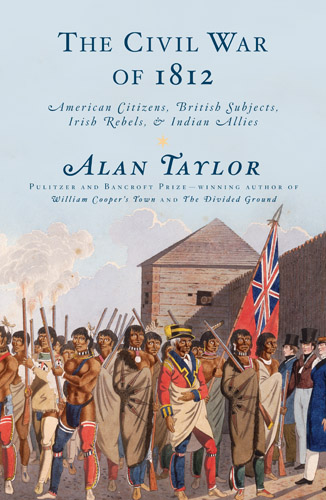
The Sacramento Bee has a very brief interview today with UC Davis professor Alan Taylor, who won fame 15 years ago when his excellent book, "William Cooper's Town" won the Pulitzer Prize.
The story notes that his current book has a chance to win another prize:
Now, the history professor at the University of California, Davis, is looking at a possible George Washington Book Prize from Washington College in Maryland – which brings $50,000.
He is among three finalists for the prize, for his "The Civil War of 1812" (Knopf, $35, 640 pages), a project that took him 15 years to complete. The judges called the book "the most original history of the conflict ever written." The prize winner will be announced May 25.
While I look forward to reading Prof. Taylor's latest book, I have a different point of view about why kids today are less interested in history. Here is what The Bee asked Taylor and his reply:
On the subject of U.S. history, are we losing touch with it?
Yes, for a number of reasons. One is the mania for testing in grades K through 12. It's well-meant, but it's undermining true teaching because teachers are required to teach to the test. As a consequence, history comes across to students as the deadly dull memorization of facts.
It is certainly possible that testing is a part of the explanation. However, my take is that the decline in interest in history is a byproduct of the decline in literacy, which is largest among younger people.
That is to say, kids no longer read very much for amusement or to pass time. They don't read newspapers, magazines or books for pleasure. They play a lot of games on the Internet, participate in social media and otherwise occupy themselves on-line in their spare time.
I'm sure many kids have history reading assignments for school. But that never inspires anyone to "love history." What inspires is taking a week or so and reading a full, well written volume like "William Cooper's Town" or any other good history book.
I suspect that the children who come through the same, heavily tested schools but happen to be the few who read books, fiction and non-fiction, become lovers of history. What distinguishes them is not that they too did not come through school systems with a lot of tests on facts. They are different because they spend less time on the computer, less time watching TV, and more time reading.
When I was in school, the Internet did not yet exist. We were not heavily tested. The schools did not push us to read good books from cover to cover. We were bored to tears by the typical textbooks which had the feel of committee work. Yet I think the same distinction existed back then: kids who enjoyed reading books on their own and who watched less TV became fans and readers of history; and those who were never introduced to books and watched a lot of TV never developed an interest in history.
The only thing which has made this disconnect from history more severe from the time I was in school is the rise of the Internet. It has destroyed an interest in reading even more than television did.


1 comment:
It's not just history, I noticed my kids are also hooked to educational sites (like science and math). After we had our
cheap cable internet connected they told us learning is more fun over the internet.
Post a Comment